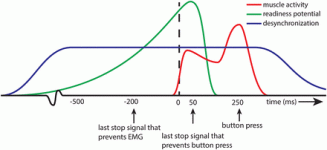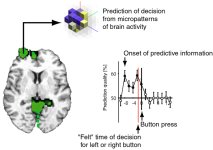Oh scratch. You just ran in to a door again. You really need to know whether the door is open before you try to enter
You are dead wrong here.
Subjects are asked to guess when they think they are just starting to make some mental activity that causes movement.
It is absurdity upon absurdity.
Nothing objective can come from it.
We are talking about milliseconds and human guessing.
A game for clowns.
Here comes an appeal to authority. My masters was Auditory gap detection and my doctorate was Ayuditory thresholds of moving sound sources, both psychophycial groups of studies where physical and psychophysical methods were very well defined and controlled. Outputs are used for determining such as information processing capacities and basses for processing intelligible signals and can be replicated with neurophysiological studies demonstrating essentially the same capacities and responsiveness.
Haynes and others are expert in gathering subjective outputs from observers that are quite rigorous following protocols where both method and response is very repeatable and reliable. The field is quite well developed and sophisiticated. Outpust form such studies for the basis form many of the most successful theories in such as flight control and pilot training another field where I have significant experience.
You can take it to the bank that the methods are robust and repeatable and correlate with corresponding physical data and neurophysicial data align quite well.
So blow your appeal to authority horn. Fortunately, If you are interested I can give you both the history and methods involved well aligned breakthroughs in hearing vision, odor, touch, etc apparatus used by persons who have deficiencies in these areas.
The most damning part of your response is the arrogance you show. These studies were done under approved protocols based on years of studies producing useful results, many standardized in handbooks for such scientific work. If it were you dong the study I'd agree you wouldn't have the vaguest notion how to control or conduct the subjective part of the study.
However all these studies were done by teams lead with senior scientists with strong reputations. I suggest you stop clanging such as 'guess' and 'absurdity' as if these were Sunday school novices having a lark.
Your entire line of reasoning is fraught with lack of knowledge about what you are shouting essentially "fake news" about.
It is very evident experimenters used collateral validating information to assure the 'guesses' were apt such as reaction time, eye movements, queuing intervals etc. Why would one go to the trouble of constructing a study if they were just going to say guess whenever you want. there many criteria outlined to observers which experimenters had confidence would yield reliable subjective data.
The only clown here is the one passing out ad hoc one liners.



